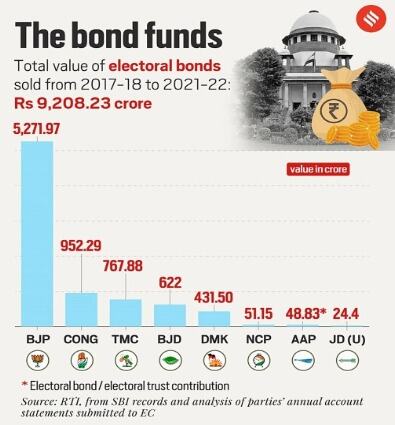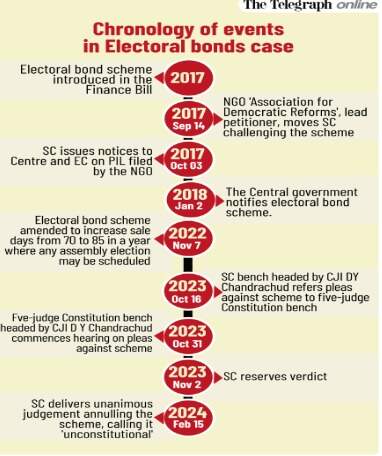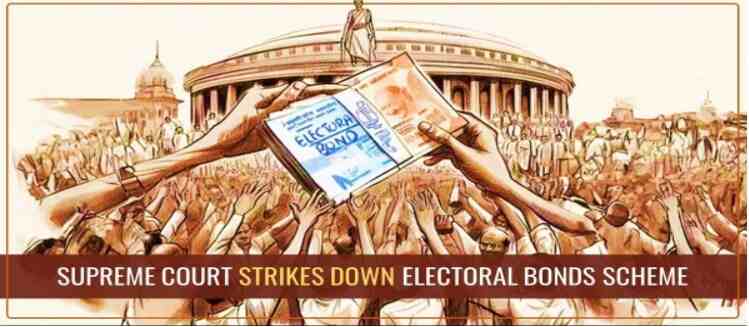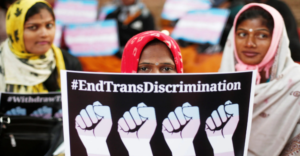India’s Supreme Court on Thursday banned electoral bonds, a mysterious source of funding for elections that has generated hundreds of millions of dollars in revenues for political parties, especially the governing Bharatiya Janata Party (BJP).
The court announced its verdict on an ongoing petition calling for the bonds to be scrapped.
The scheme has been under scrutiny, and the top court had in November said the bonds “put a premium on opacity” and can be “misused for money laundering”.
The court’s ruling could fundamentally determine how India’s coming general elections, between March and May, are fought; how much of a role untraced money plays in it; and who has the resources to dominate the political landscape.
Introduction
Under the electoral bond system introduced by Prime Minister Narendra Modi’s government in 2018, these bonds must be bought from the State Bank of India (SBI) but can be donated to parties anonymously. While donors using electoral bonds are technically anonymous, SBI being a public sector bank effectively gives the governing party undeclared access to its data, which is likely to dissuade large donors from using electoral bonds to donate to opposition parties, according to critics.
Furthermore, in 2017, India’s central bank, the Reserve Bank of India (RBI), cautioned the Modi government that the bonds could be misused by shell companies to “facilitate Money Laundering”. In 2019, the Election Commission of India (ECI) described the system as “a retrograde step as far as transparency of donations is concerned.
As India prepares for more than 900 million voters to go to the polls to elect a new government between March and May, these funds have allowed the BJP to transform itself into a dominant electoral machine. From financing tens of thousands of WhatsApp groups promoting its agenda to paying for the block-booking of private jets, electoral bonds have provided the BJP with a massive injection of resources, which give it a clear edge over its rivals.
What are electoral bonds?
Electoral bonds are interest-free bearer bonds or money instruments that can be purchased by companies and individuals in India from authorized branches of the State Bank of India (SBI). These bonds are sold in multiples of Rs 1,000, Rs 10,000, Rs 1 lakh, Rs 10 lakh, and Rs 1 crore.
They can be purchased through a KYC-compliant account to make donations to a political party. Before the scheme was introduced the political parties had to make public all donations above Rs 20,000. Also, no corporate company was allowed to make donations amounting to more than 7.5% of their total profit or 10% of revenue.
Who can receive funding via electoral bonds?
Political parties that secured at least 1% of the votes polled in the recent Lok Sabha or State Assembly elections and are registered under the RPA can get a verified account from the Election Commission of India (ECI). The bond amounts are deposited in this account within 15 days of their purchase.
The political party has to encash the amount within those 15 days, and the amount received as a donation gets deposited into the Prime Minister’s Relief Fund. These bonds, however, are not available for purchase all the time. They are available for 10 days in a gap of four months (January, April, July, and October). They are also open for 30 days in Lok Sabha election years.
Challenges to the scheme in the Supreme Court:
Since the five-judge constitutional bench commenced hearings on October 31, several arguments have been made against the constitutionality and legality of the Electoral Bond Scheme and the threat it poses to Indian democracy by petitioners lawyers including senior advocates Prashant Bhushan, Nizam Pasha, Kapil Sibal, Vijay Hansaria, Sanjay Hegde and Advocate Shadan Farasat.
- Black money changed to white
- Violates Right to Information
- An opaque instrument that is not entirely anonymous
- Promotes corruption
- Eliminates level playing field for political parties in Opposition
- Differentiates between corporations and citizens
- Unfair to the shareholder investing in Companies
- No way to stop trading of electoral bonds

How do EBs benefit the BJP?
The BJP is the single biggest beneficiary of EB donations. Data from the ECI show that 57 percent of total donations between 2018 and March 2022 through EBs went to the BJP, amounting to 52.71 billion rupees (about $635m). By comparison, the next largest party, the Indian National Congress, received 9.52 billion rupees (about $115m).EB rules specify that only the SBI can sell these bonds. This, many argue, ultimately gives the government of the day unchecked power.
The mismatch between the funds received by the BJP and its nearest rival, the Congress, serves to illustrate the unequal playing field that EBs have created, critics say. For instance, in May 2023, the Congress and the BJP squared off against each other in state assembly polls in the southern state of Karnataka. Affidavits filed by both parties with the ECI show that the BJP spent 1.97 billion rupees ($24m) compared with the Congress’s spending of 1.36 billion rupees ($16m).
The Modi government also holds the power to time the sales of these bonds. While EB rules technically permit the sale of bonds only in the first 10 days of every new quarter – in January, April, July, and October – the government broke its rules and allowed donors to buy these bonds on the eve of two crucial elections in May and November 2018. This forms part of the case currently going through the Supreme Court.
Who is challenging EBs in the Supreme Court?
In 2017, and later in 2018, two NGOs – ADR and Common Cause – and the Communist Party of India (Marxist) filed two separate petitions in the Supreme Court, urging it to put an end to the EB system. Now, six years later, the court has finally pronounced its ruling in these cases, months after it announced that it had concluded hearings in the petitions challenging the electoral bond system in November 2023.
This has not stopped widespread sales of these bonds. The latest tranche of EBs was being sold from January 2 to 11 at 29 locations across the country. This money is likely to form the bulk of funding for parties’ political campaigns in the run-up to this year’s general elections.

Directions issued
The SBI has been ordered to immediately stop the issuance of any further electoral bonds and furnish details of such bonds purchased by political parties since April 12, 2019, to the ECI by March 6. Such details must include the date of purchase of each bond, the name of the purchaser of the bond, and the denomination of the bond purchased.
- The ECI shall subsequently publish all such information shared by the SBI on its official website by 13 March 2024.
- Electoral bonds that are within the validity period of fifteen days but have not yet been encashed by the political party will have to be returned following which the issuing bank will refund the amount to the purchaser’s account.
The Supreme Court on February 15 struck down the Centre’s electoral bond scheme which facilitates anonymous political donations for being unconstitutional.
It underscored that the scheme violates the right to information under Article 19(1)(a) of the Constitution.
The court also struck down the amendments made to the Income Tax Act and the Representation of People Act which enabled such anonymous political contributions.
Electoral bond and its sharing
According to reports, Rs 13,000 crore has been transferred to several political parties between March 2018 and July 2023. Electoral bonds worth Rs 9,208 crore were sold between 2018 and 2022, and the BJP secured 58 percent of the total money, say reports.
The BJP received the lion’s share of the donations through electoral bonds in 2021-22, followed by the Trinamool Congress (TMC) and the Congress.
According to a report released by the Association for Democratic Reforms (ADR) in March 2023, over 66 percent of the total income of the seven national parties came from electoral bonds and unknown sources. The seven national parties were BJP, Congress, Trinamool Congress (TMC), Nationalist Congress Party (NCP), CPI, CPI(M) and the Meghalaya-based National People’s Party.
Conclusion
February 15, 2024, marks a historic day in India’s democracy as the Supreme Court delivered a landmark verdict striking down the Electoral Bonds Scheme. Upholding democracy as the Constitution’s basic structure, the Court found the scheme unconstitutional in a unanimous decision, addressing every challenge raised.
This decision requires the government to cease issuing electoral bonds immediately and disclose all relevant information to the Election Commission of India. The Court’s ruling highlights the scheme’s violation of the right to information and rejects the government’s arguments, emphasizing that the Constitution cannot ignore potential misuse.
However, since their inception, electoral bonds have been a subject of significant controversy, with many questioning whether they have achieved their intended goals or have instead facilitated opacity in political financing.
– RIYA SINGH
MUST READ: FIELDS OF FURY: THE UNFOLDING SAGA OF FARMERS PROTEST 2.0





